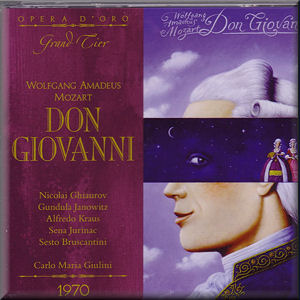 |
 |
|


alternatively
CD: MDT
AmazonUK
AmazonUS
|
Wolfgang Amadeus MOZART (1756-1791)
Don Giovanni
 Don Giovanni - Nicolai Ghiaurov (bass), Leporello - Sesto Bruscantini
(baritone), Don Ottavio - Alfredo Kraus (tenor), Masetto - Walter
Monachesi (baritone), Donna Anna - Gundula Janowitz (soprano), Donna
Elvira - Sena Jurinac (soprano), Zerlina - Olivera Miliakovic (soprano),
Commendatore - Dmitri Petkov (bass).
Don Giovanni - Nicolai Ghiaurov (bass), Leporello - Sesto Bruscantini
(baritone), Don Ottavio - Alfredo Kraus (tenor), Masetto - Walter
Monachesi (baritone), Donna Anna - Gundula Janowitz (soprano), Donna
Elvira - Sena Jurinac (soprano), Zerlina - Olivera Miliakovic (soprano),
Commendatore - Dmitri Petkov (bass).
RAI Symphony Orchestra and Chorus of Rome/Carlo Maria Giulini.
rec. live, Rome, 12 May 1970
 OPERA D’ORO GRAND TIER OPD 7080 [3 CDs: 63:15 + 67:53 + 35:45]
OPERA D’ORO GRAND TIER OPD 7080 [3 CDs: 63:15 + 67:53 + 35:45]

|
|
|
There are two live recorded performances of “Don Giovanni”
from 1970 made within a couple of months of each other. Each
has Nicolai Ghiaurov, commanding in the lead role, Gundula Janowitz
thrilling as Donna Anna and the lesser-known Olivera Miliakovic
competent but bland as Zerlina and occasionally out of tune.
One is this broadcast by the RAI Symphony Orchestra and Chorus
of Rome under Giulini before a quiet studio audience and the
other is a Salzburg Festival performance under Karajan. As such,
they cry out to be compared, featuring two major conductors
and two celebrated singers in favourite roles.
First, the sonics: both are very listenable but the sound in
the RAI broadcast is much sharper and more wiry, with a fair
amount of blare and distortion in concerted passages; the Salzburg
recording is somewhat duller and more distant but easier on
the ear.
The casts and forces assembled are both admirable: the Vienna
Symphony Orchestra is undoubtedly smoother, keeps in tune better
and is more refined than the intermittently untidy Italian orchestra
but the latter is lithe and responsive under Giulini and remains
very acceptable. Karajan is more animated than Giulini and better
at generating tension at key dramatic moments. Although at times
Giulini achieves a grandeur closer to Klemperer, ultimately
the performance remains a little earth-bound.
Ghiaurov sings virtually identically in both: a big, smooth,
rich bass, properly flexible and seductive if occasionally a
little monotonous; not much wit or humour just a massive, testosterone-pumped
confidence. Bruscantini has rather too neat, light and refined
a baritone for the earthy Leporello and he sounds rather more
like the Don’s uncle, but he delivers the Italian text with
relish. Having said that, Geraint Evans’, bluffer, broader more
blustery manner is more apt for depicting the aristocratic philanderer’s
put-upon side-kick and Evans’ coarser way with the comedy isn’t
necessarily out of place. To my ears, Stuart Burrows’ mellifluous
yet powerful tenor for Karajan is far preferable to that of
Alfredo Kraus, who, contrary to expectation, is rather acidulous
of tone, snatching and yelping at some notes and unable to take
“cercate a consolar” in one breath in “Il mio tesoro”. As much
as I am a huge admirer of Sena Jurinac, I suggest that she isn’t
quite comfortable or at her best as Elvira here; Giulini tries
to ease her round the sharp corners of her arias but she is
gusty at this stage of her career. Teresa Zylis-Gara for Karajan
is finer, purer and more flexible. Giulini’s Commendatore is
Slavic, weak and wobbly; Victor von Halem, by contrast for Karajan,
is everything he should be: firm, brazen, huge-voiced and chilling.
Janowitz is simply divine in both recordings, dominating the
ensembles, agile and soaring in her solos. I love her fluty
tone. Its rather virginal, disembodied character is perfect
for the prim and proper Donna Anna.
The Karajan account emerges as the clear winner. However, if
you want Giulini at his best, his famous, earlier EMI studio
recording remains the first choice; it is tauter, more characterful
and by and large better sung than this later performance.
This de luxe Opera d’Oro “Grand Tier” version offers a full
libretto, synopsis, notes, photos and biographies. It is also
available in the standard bargain issue with nothing but the
briefest of synopses and cues.
Ralph Moore
|
|















